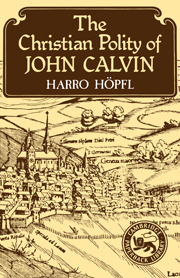Book contents
- Frontmatter
- Contents
- Preface
- Note on sources, orthography, notes and translations
- Introduction
- 1 The training of a lawgiver
- 2 The Institution: the first version
- 3 The first public ministry
- 4 Reconstruction
- 5 The Institution of 1543
- 6 Geneva and Calvin, 1541–64
- 7 The civil order of a Christian commonwealth
- 8 Political morality in the thought of Calvin
- 9 The laws and mores of a Christian commonwealth
- 10 Unfinished business: a speculative summary and postscript
- Appendix I Calvin's conversion
- Appendix II Predestination
- Notes
- Bibliography
- Index
- Cambridge Studies in the History and Theory of Politics
3 - The first public ministry
Published online by Cambridge University Press: 24 October 2009
- Frontmatter
- Contents
- Preface
- Note on sources, orthography, notes and translations
- Introduction
- 1 The training of a lawgiver
- 2 The Institution: the first version
- 3 The first public ministry
- 4 Reconstruction
- 5 The Institution of 1543
- 6 Geneva and Calvin, 1541–64
- 7 The civil order of a Christian commonwealth
- 8 Political morality in the thought of Calvin
- 9 The laws and mores of a Christian commonwealth
- 10 Unfinished business: a speculative summary and postscript
- Appendix I Calvin's conversion
- Appendix II Predestination
- Notes
- Bibliography
- Index
- Cambridge Studies in the History and Theory of Politics
Summary
At Farel's urging, Calvin went to Geneva in August 1536 to become ‘reader in Holy Scripture’, not being selected for the pastorate, it seems, until some months later. But within little more than a year he, with Farel, was recognized as the leading spokesman of reformation at Geneva. By November 1537 he had produced, either wholly or for the most part, three substantial pieces bearing on the public form of an evangelical church: the Confession de la Foy for the inhabitants of Geneva, presented to the Petit Conseil on 10 November 1536, the Articles sur le Gouvernement de l'Eglise, presented on 16 January 1537, and the Catechisme (originally entitled Instruction et Confession de Foy) of November 1537. Of these, the Articles were the most specifically organizational. The Catechisme and the Confession de la Foy, first published in French, were subsequently (in 1538) translated into Latin, equipped with a preface enjoining solidarity and mutual tolerance on evangelicals, and despatched for consideration by that wider audience which was never far from Calvin's mind.
The Confession and the Catechisme are Calvin's attempts to instruct an unlearned public about the essentials of faith, and the brevity this entailed meant that Calvin was constrained to concentrate on what he really did consider essential, for he had not the space to cover everything that he might have classed as ‘essential’ from some point of view or other. Interpretations of Calvin's thought may therefore be measured for fit against these two works.
- Type
- Chapter
- Information
- The Christian Polity of John Calvin , pp. 56 - 76Publisher: Cambridge University PressPrint publication year: 1982

